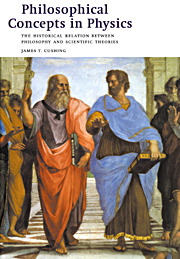 Philosophical Concepts in Physics
Philosophical Concepts in Physics Book contents
- Frontmatter
- Contents
- Preface
- Copyright acknowledgments
- PART I The scientific enterprise
- PART II Ancient and modern models of the universe
- PART III The Newtonian universe
- PART IV A perspective
- PART V Mechanical versus electrodynamical world views
- PART VI The theory of relativity
- PART VII The quantum world and the completeness of quantum mechanics
- PART VIII Some philosophical lessons from quantum mechanics
- PART IX A retrospective
- Notes
- General references
- Bibliography
- Author index
- Subject index
PART VIII - Some philosophical lessons from quantum mechanics
Published online by Cambridge University Press: 05 June 2012
- Frontmatter
- Contents
- Preface
- Copyright acknowledgments
- PART I The scientific enterprise
- PART II Ancient and modern models of the universe
- PART III The Newtonian universe
- PART IV A perspective
- PART V Mechanical versus electrodynamical world views
- PART VI The theory of relativity
- PART VII The quantum world and the completeness of quantum mechanics
- PART VIII Some philosophical lessons from quantum mechanics
- PART IX A retrospective
- Notes
- General references
- Bibliography
- Author index
- Subject index
Summary
[I] think I can safely say that nobody understands quantum mechanics.
Richard Feynman, The Character of Physical LawQuantum mechanics [is] that mysterious, confusing discipline, which none of us really understands but which we know how to use. It works perfectly, as far as we can tell, in describing physical reality, but it is a ‘counter-intuitive discipline’…
Murray Gell-Mann, Questions for the Future[The quantum] postulate implies a renunciation as regards the causal space-time co-ordination of atomic processes.
Niels Bohr, Atomic Theory and the Description of NatureIt should be emphasized, however, that the probability function does not in itself represent a course of events in the course of time. It represents a tendency for events and our knowledge of events. The probability function can be connected with reality only if one essential condition is fulfilled: if a new measurement is made to determine a certain property of the system.
[T]he idea of an objective real world whose smallest parts exist objectively in the same sense as stones or trees exist, independently of whether or not we observe them…is impossible …
Werner Heisenberg, Physics and Philosophy[In] quantum theory it is the principle of causality, or more accurately that of determinism, which must be dropped and replaced by something else.… We now have a new form of the law of causality.… It is as follows: if in a certain process the initial conditions are determined as accurately as the uncertainty relations permit, then the probabilities of all possible subsequent states are governed by exact laws.
Max Born, The Restless Universe- Type
- Chapter
- Information
- Philosophical Concepts in PhysicsThe Historical Relation between Philosophy and Scientific Theories, pp. 317 - 318Publisher: Cambridge University PressPrint publication year: 1998


